高一优秀英语作文:关于河水污染的感想
- 格式:docx
- 大小:36.19 KB
- 文档页数:1
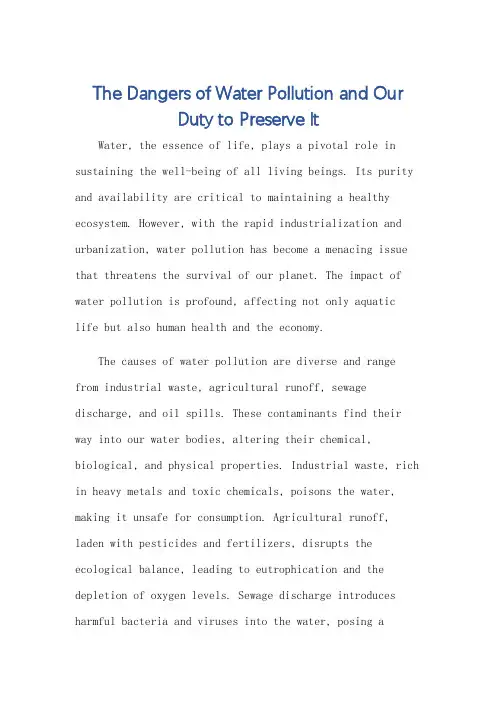
The Dangers of Water Pollution and OurDuty to Preserve ItWater, the essence of life, plays a pivotal role in sustaining the well-being of all living beings. Its purity and availability are critical to maintaining a healthy ecosystem. However, with the rapid industrialization and urbanization, water pollution has become a menacing issue that threatens the survival of our planet. The impact of water pollution is profound, affecting not only aquaticlife but also human health and the economy.The causes of water pollution are diverse and range from industrial waste, agricultural runoff, sewage discharge, and oil spills. These contaminants find their way into our water bodies, altering their chemical, biological, and physical properties. Industrial waste, rich in heavy metals and toxic chemicals, poisons the water, making it unsafe for consumption. Agricultural runoff, laden with pesticides and fertilizers, disrupts the ecological balance, leading to eutrophication and the depletion of oxygen levels. Sewage discharge introduces harmful bacteria and viruses into the water, posing asignificant health risk. Oil spills, on the other hand, coat the water surface, preventing sunlight from reaching aquatic plants, thus disrupting the food chain.The consequences of water pollution are far-reaching. It leads to the depletion of fish and other aquatic life, affecting the food supply and livelihoods of millions. It contaminates drinking water, leading to various health problems such as diarrhea, cholera, and skin diseases. Water pollution also has a negative impact on tourism and fishing industries, hurting the economy. Furthermore, it degrades the quality of life, affecting the social and cultural fabric of communities.In addressing water pollution, a multipronged approach is necessary. Governments must enforce strict environmental laws and regulations to limit industrial waste and sewage discharge. Technologies such as waste water treatment plants and zero-discharge systems should be encouraged and implemented. Additionally, agricultural practices should be revamped to reduce the use of pesticides and fertilizers. Public awareness and education are also crucial infostering a culture of conservation and responsibility towards water resources.Individuals can play their part by conserving water, reducing waste, and promoting sustainable practices. Simple actions like fixing leaky faucets, using water-saving appliances, and recycling water can help conserve precious water resources. We can also support environment-friendly policies and initiatives by voting for responsible candidates and participating in community clean-up drives. In conclusion, water pollution is a pressing issue that requires urgent action from all stakeholders. It is ourduty to preserve this vital resource for future generations. By adopting sustainable practices, enforcing strict laws, and fostering public awareness, we can ensure clean andsafe water for a healthier and more prosperous world.**水污染的危害与我们的保护责任**水,生命之源,对于维持所有生物的健康至关重要。
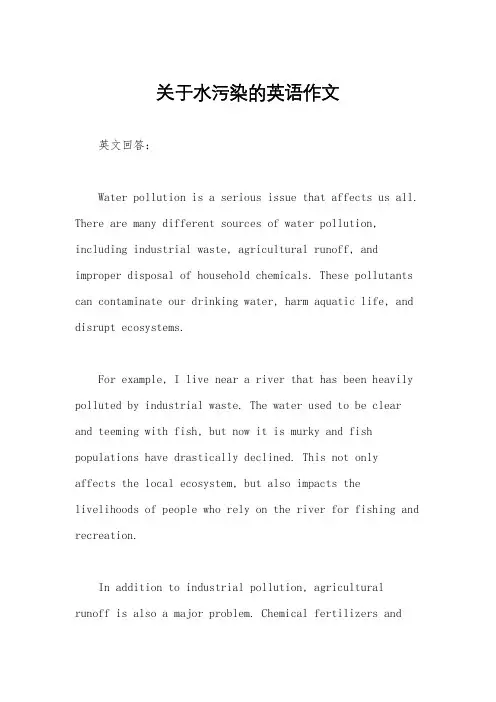
关于水污染的英语作文英文回答:Water pollution is a serious issue that affects us all. There are many different sources of water pollution, including industrial waste, agricultural runoff, and improper disposal of household chemicals. These pollutants can contaminate our drinking water, harm aquatic life, and disrupt ecosystems.For example, I live near a river that has been heavily polluted by industrial waste. The water used to be clear and teeming with fish, but now it is murky and fish populations have drastically declined. This not onlyaffects the local ecosystem, but also impacts the livelihoods of people who rely on the river for fishing and recreation.In addition to industrial pollution, agriculturalrunoff is also a major problem. Chemical fertilizers andpesticides used on farms can seep into waterways, causing algal blooms and harming aquatic organisms. I have seenthis firsthand when visiting a nearby lake, where the water was covered in a thick layer of green algae, making it unsafe for swimming and boating.Water pollution not only affects the environment, but also poses a risk to human health. Contaminated drinking water can lead to serious illnesses and diseases, and it is often the most vulnerable communities that are affected the most. For example, in some developing countries, people are forced to drink water from polluted rivers and streams because they have no other options, leading to widespread health problems.中文回答:水污染是一个严重的问题,影响着我们所有人。
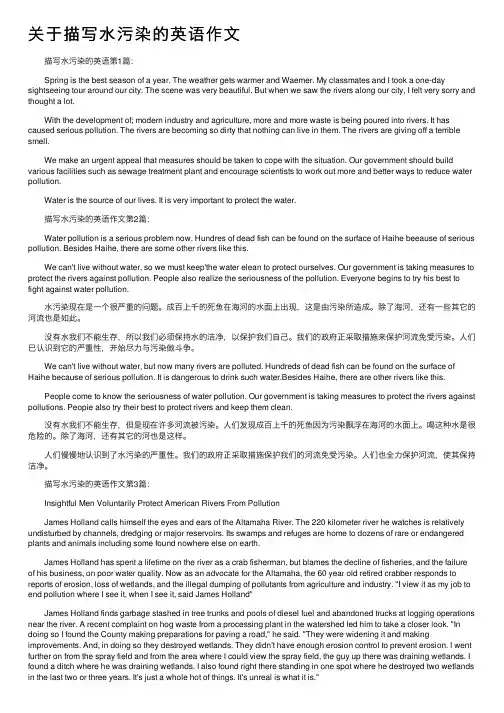
关于描写⽔污染的英语作⽂ 描写⽔污染的英语第1篇: Spring is the best season of a year. The weather gets warmer and Waemer. My classmates and I took a one-day sightseeing tour around our city. The scene was very beautiful. But when we saw the rivers along our city, I felt very sorry and thought a lot. With the development of; modern industry and agriculture, more and more waste is being poured into rivers. It has caused serious pollution. The rivers are becoming so dirty that nothing can live in them. The rivers are giving off a terrible smell. We make an urgent appeal that measures should be taken to cope with the situation. Our government should build various facilities such as sewage treatment plant and encourage scientists to work out more and better ways to reduce water pollution. Water is the source of our lives. It is very important to protect the water. 描写⽔污染的英语作⽂第2篇: Water pollution is a serious problem now. Hundres of dead fish can be found on the surface of Haihe beeause of serious pollution. Besides Haihe, there are some other rivers like this. We can't live without water, so we must keep'the water elean to protect ourselves. Our government is taking measures to protect the rivers against pollution. People also realize the seriousness of the pollution. Everyone begins to try his best to fight against water pollution. ⽔污染现在是⼀个很严重的问题。
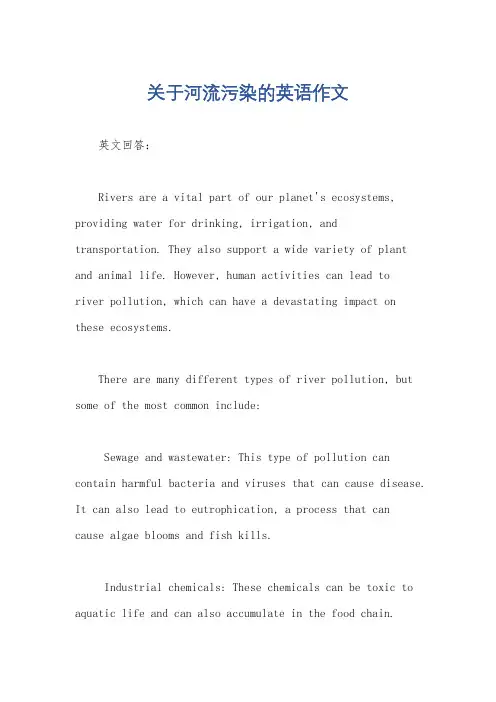
关于河流污染的英语作文英文回答:Rivers are a vital part of our planet's ecosystems, providing water for drinking, irrigation, and transportation. They also support a wide variety of plant and animal life. However, human activities can lead toriver pollution, which can have a devastating impact on these ecosystems.There are many different types of river pollution, but some of the most common include:Sewage and wastewater: This type of pollution can contain harmful bacteria and viruses that can cause disease. It can also lead to eutrophication, a process that cancause algae blooms and fish kills.Industrial chemicals: These chemicals can be toxic to aquatic life and can also accumulate in the food chain.Agricultural runoff: This type of pollution cancontain fertilizers, pesticides, and herbicides that can harm aquatic life and pollute drinking water sources.Sedimentation: This type of pollution can occur when soil is washed into rivers by erosion. It can clog waterways and smother aquatic life.River pollution can have a devastating impact onaquatic ecosystems. It can kill fish and other aquatic life, destroy habitat, and make water unsafe for drinking. It can also have a negative impact on human health, causingdisease and other health problems.There are a number of things that can be done to reduce river pollution. These include:Reducing sewage and wastewater discharge: This can be done by investing in wastewater treatment plants and by promoting the use of composting toilets.Reducing industrial pollution: This can be done by regulating the discharge of industrial chemicals and by promoting the use of cleaner production methods.Reducing agricultural runoff: This can be done by using conservation tillage practices and by planting buffer strips along rivers.Reducing erosion: This can be done by planting trees and other vegetation along riverbanks and by using erosion control measures.By taking these steps, we can help to protect ourrivers and the ecosystems that depend on them.中文回答:河流是地球生态系统的重要组成部分,为饮用、灌溉和运输提供水源。
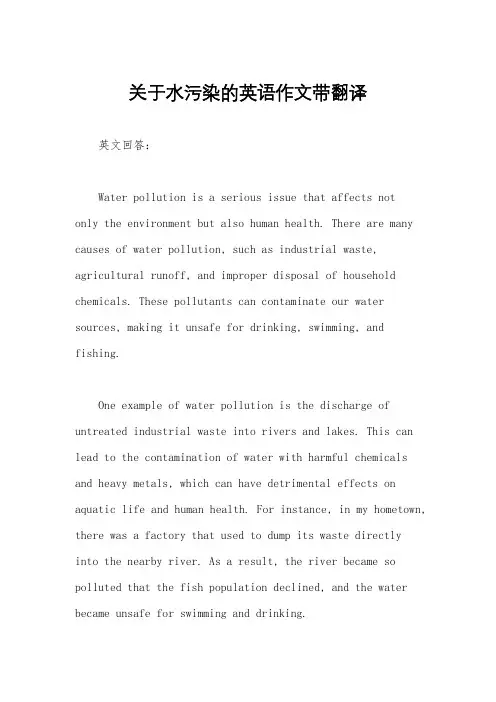
关于水污染的英语作文带翻译英文回答:Water pollution is a serious issue that affects notonly the environment but also human health. There are many causes of water pollution, such as industrial waste, agricultural runoff, and improper disposal of household chemicals. These pollutants can contaminate our water sources, making it unsafe for drinking, swimming, and fishing.One example of water pollution is the discharge of untreated industrial waste into rivers and lakes. This can lead to the contamination of water with harmful chemicals and heavy metals, which can have detrimental effects on aquatic life and human health. For instance, in my hometown, there was a factory that used to dump its waste directlyinto the nearby river. As a result, the river became so polluted that the fish population declined, and the water became unsafe for swimming and drinking.Another example is the runoff of pesticides and fertilizers from agricultural fields into nearby water bodies. This can lead to the eutrophication of water, where excessive nutrients cause algal blooms and deplete oxygen levels, leading to the death of aquatic organisms. I have seen this happen in the countryside where I live, where the excessive use of fertilizers has led to the contamination of the local pond, causing a foul smell and the death of fish and other aquatic life.中文回答:水污染是一个严重的问题,不仅影响环境,还影响人类健康。
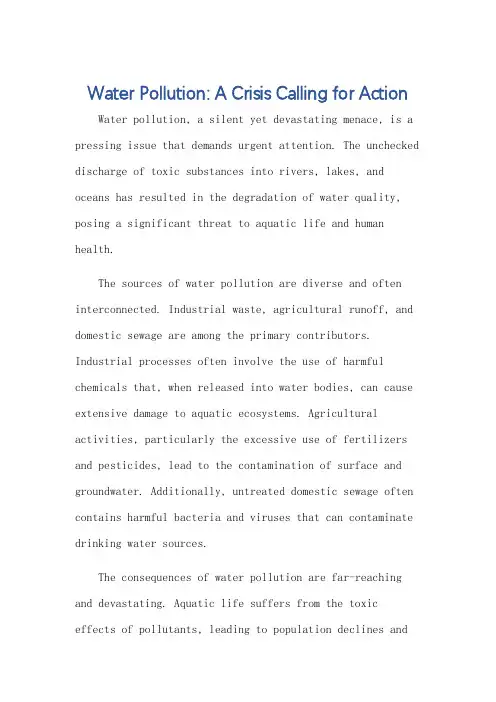
Water Pollution: A Crisis Calling for Action Water pollution, a silent yet devastating menace, is a pressing issue that demands urgent attention. The unchecked discharge of toxic substances into rivers, lakes, and oceans has resulted in the degradation of water quality, posing a significant threat to aquatic life and human health.The sources of water pollution are diverse and often interconnected. Industrial waste, agricultural runoff, and domestic sewage are among the primary contributors. Industrial processes often involve the use of harmful chemicals that, when released into water bodies, can cause extensive damage to aquatic ecosystems. Agricultural activities, particularly the excessive use of fertilizers and pesticides, lead to the contamination of surface and groundwater. Additionally, untreated domestic sewage often contains harmful bacteria and viruses that can contaminate drinking water sources.The consequences of water pollution are far-reaching and devastating. Aquatic life suffers from the toxiceffects of pollutants, leading to population declines andeven extinction. Humans, on the other hand, are exposed to these pollutants through drinking contaminated water or consuming contaminated seafood, which can lead to a range of health issues, including gastrointestinal diseases, skin infections, and even cancer.Moreover, water pollution also has significant economic impacts. It can lead to the closure of fisheries and tourism industries, affecting local economies and livelihoods. The costs of treating and managing water pollution are also immense, further burdening already stretched budgets.To address this pressing issue, a multi-faceted approach is necessary. Strict regulations and enforcement mechanisms must be established to limit the discharge of pollutants into water bodies. Industries must be required to treat their waste effectively before disposing of it, and agricultural practices must be modified to reduce the use of harmful chemicals. Additionally, public awareness and education are crucial in encouraging individuals and communities to adopt sustainable practices and reduce their contribution to water pollution.In conclusion, water pollution is a critical issue that requires immediate action. It poses a significant threat to both aquatic life and human health, and its economic impacts are profound. By taking concerted efforts to reduce pollution and protect our water resources, we can ensure a healthier and more sustainable future for all.**水污染:危机呼唤行动**水污染,这一无声却又极具破坏性的威胁,已成为亟待关注的重要问题。
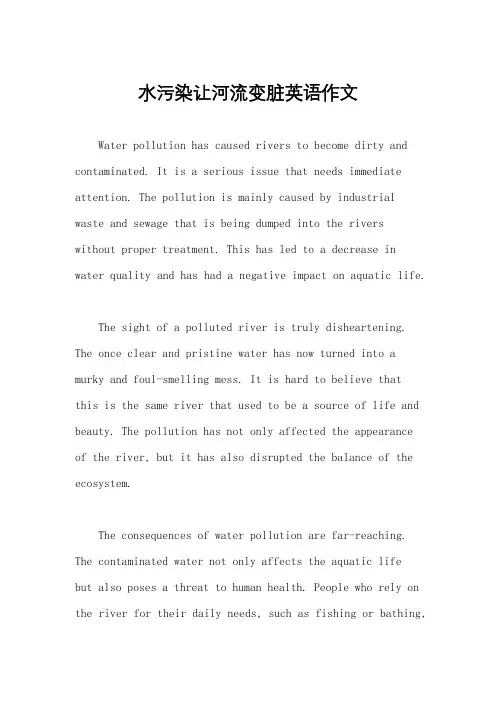
水污染让河流变脏英语作文Water pollution has caused rivers to become dirty and contaminated. It is a serious issue that needs immediate attention. The pollution is mainly caused by industrial waste and sewage that is being dumped into the riverswithout proper treatment. This has led to a decrease in water quality and has had a negative impact on aquatic life.The sight of a polluted river is truly disheartening. The once clear and pristine water has now turned into a murky and foul-smelling mess. It is hard to believe thatthis is the same river that used to be a source of life and beauty. The pollution has not only affected the appearanceof the river, but it has also disrupted the balance of the ecosystem.The consequences of water pollution are far-reaching. The contaminated water not only affects the aquatic lifebut also poses a threat to human health. People who rely on the river for their daily needs, such as fishing or bathing,are at risk of falling ill due to the pollutants present in the water. This is a grave concern and needs to be addressed urgently.The pollution of rivers is not only an environmental issue but also an economic one. Many communities rely on the rivers for their livelihoods, such as fishing or tourism. With the degradation of water quality, these industries suffer a great deal. Fish populations decline, and tourists are deterred from visiting polluted areas. This leads to a loss of income and a decline in the overall economy of the region.Efforts to combat water pollution have been made, but more needs to be done. Strict regulations and penalties should be imposed on industries that discharge untreated waste into rivers. Additionally, public awareness campaigns should be conducted to educate people about the importance of clean water and the impact of pollution. It is crucial that everyone understands their role in preserving the rivers and takes necessary actions to prevent further pollution.In conclusion, water pollution has caused rivers to become dirty and contaminated. It is a pressing issue that requires immediate attention. The pollution not only affects the appearance of the rivers but also poses a threat to the ecosystem, human health, and the economy. It is essential that strict regulations are enforced and public awareness is raised to combat this problem.。
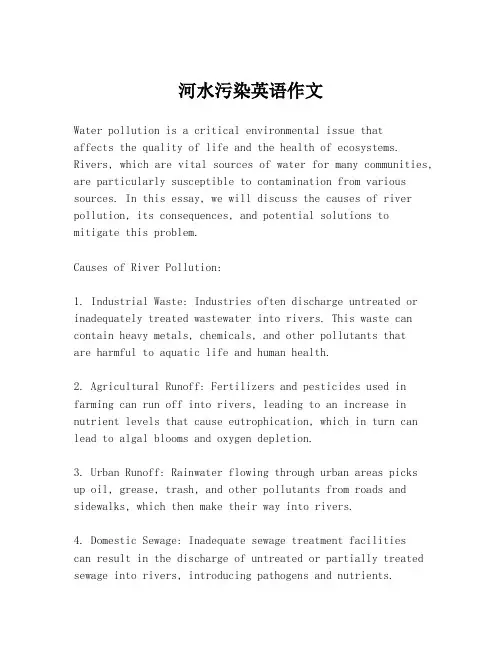
河水污染英语作文Water pollution is a critical environmental issue thataffects the quality of life and the health of ecosystems. Rivers, which are vital sources of water for many communities, are particularly susceptible to contamination from various sources. In this essay, we will discuss the causes of river pollution, its consequences, and potential solutions to mitigate this problem.Causes of River Pollution:1. Industrial Waste: Industries often discharge untreated or inadequately treated wastewater into rivers. This waste can contain heavy metals, chemicals, and other pollutants thatare harmful to aquatic life and human health.2. Agricultural Runoff: Fertilizers and pesticides used in farming can run off into rivers, leading to an increase in nutrient levels that cause eutrophication, which in turn can lead to algal blooms and oxygen depletion.3. Urban Runoff: Rainwater flowing through urban areas picks up oil, grease, trash, and other pollutants from roads and sidewalks, which then make their way into rivers.4. Domestic Sewage: Inadequate sewage treatment facilitiescan result in the discharge of untreated or partially treated sewage into rivers, introducing pathogens and nutrients.5. Mining Activities: Mining can lead to the release ofharmful substances such as mercury and arsenic into rivers, which can have devastating effects on aquatic life and the people who rely on the water.Consequences of River Pollution:1. Health Risks: Contaminated water can lead to waterborne diseases, affecting the health of people who rely on riversfor drinking, washing, and cooking.2. Ecological Impact: Pollution can lead to the death of fish and other aquatic species, disrupting the food chain and the balance of ecosystems.3. Economic Losses: Rivers play a significant role in tourism, fishing, and agriculture. Pollution can lead to a decline in these industries, affecting local economies.4. Loss of Biodiversity: Pollution can lead to the extinction of certain species that are unable to adapt to the polluted environment.Solutions to River Pollution:1. Strict Regulations: Governments should enforce strict regulations on industries and agriculture to prevent the discharge of pollutants into rivers.2. Improved Wastewater Treatment: Upgrading wastewatertreatment facilities to ensure that all effluents are treated to a high standard before being discharged.3. Public Awareness: Educating the public about the importance of keeping rivers clean and the consequences of pollution can encourage responsible behavior.4. Restoration Efforts: Undertaking projects to restore polluted rivers, such as planting vegetation to absorb excess nutrients and improve water quality.5. Sustainable Practices: Promoting sustainable farming and industrial practices that minimize the use of harmful chemicals and encourage recycling and reuse of water.In conclusion, river pollution is a multifaceted problem that requires a concerted effort from individuals, industries, and governments to address. By understanding the causes and consequences, and by implementing effective solutions, we can work towards preserving our rivers for future generations.。
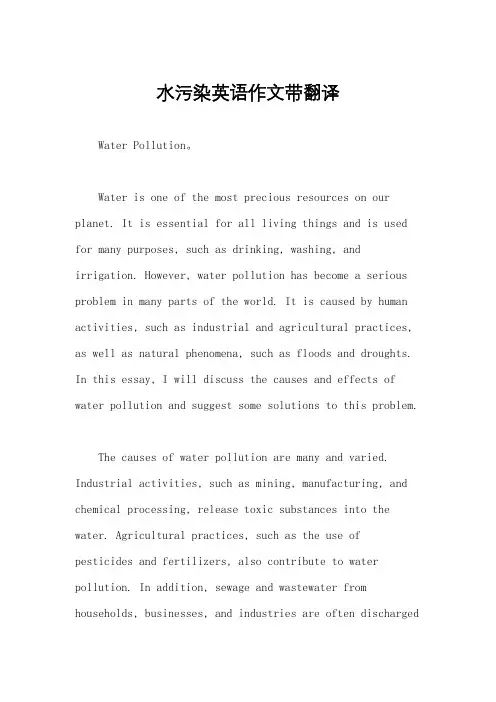
水污染英语作文带翻译Water Pollution。
Water is one of the most precious resources on our planet. It is essential for all living things and is used for many purposes, such as drinking, washing, and irrigation. However, water pollution has become a serious problem in many parts of the world. It is caused by human activities, such as industrial and agricultural practices, as well as natural phenomena, such as floods and droughts. In this essay, I will discuss the causes and effects of water pollution and suggest some solutions to this problem.The causes of water pollution are many and varied. Industrial activities, such as mining, manufacturing, and chemical processing, release toxic substances into the water. Agricultural practices, such as the use of pesticides and fertilizers, also contribute to water pollution. In addition, sewage and wastewater from households, businesses, and industries are often dischargedinto rivers and lakes without proper treatment. Finally, natural disasters, such as floods and droughts, can also cause water pollution by washing away soil and other debris into water bodies.The effects of water pollution are numerous and can be devastating. First and foremost, it can harm human health. Polluted water can cause a variety of illnesses, such as diarrhea, cholera, and typhoid fever. It can also lead to long-term health problems, such as cancer and birth defects. In addition, water pollution can harm aquatic life, such as fish and other animals that live in water. It can also damage ecosystems and reduce biodiversity. Finally, water pollution can have economic consequences, such as reduced tourism and decreased property values.To address the problem of water pollution, several solutions can be implemented. First, governments canenforce stricter regulations on industrial and agricultural practices to reduce the amount of toxic substances released into the water. Second, sewage and wastewater treatment plants can be built to treat the water before it isdischarged into rivers and lakes. Third, individuals can take action by reducing their use of pesticides and fertilizers, properly disposing of household waste, and conserving water. Finally, education and awareness campaigns can be conducted to inform people about the importance of clean water and the dangers of water pollution.In conclusion, water pollution is a serious problem that affects the health of humans and the environment. It is caused by a variety of human activities and natural phenomena. The effects of water pollution are numerous and can be devastating. However, there are several solutions that can be implemented to address this problem, including stricter regulations, sewage and wastewater treatment, individual actions, and education and awareness campaigns. By taking action, we can ensure that water remains a precious resource for generations to come. 。
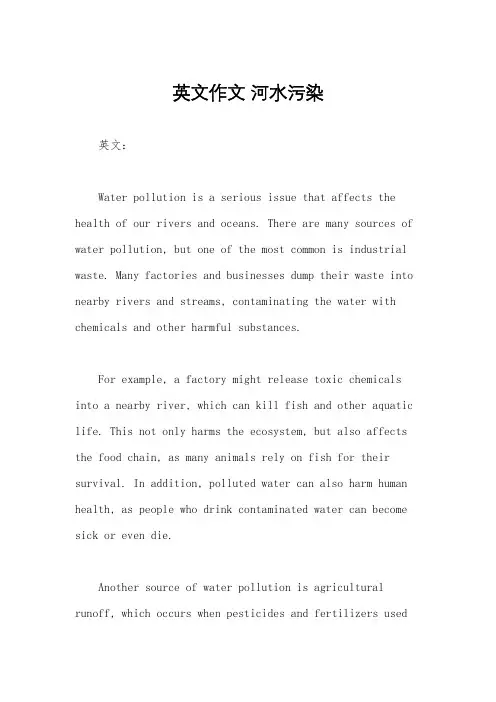
英文作文河水污染英文:Water pollution is a serious issue that affects the health of our rivers and oceans. There are many sources of water pollution, but one of the most common is industrial waste. Many factories and businesses dump their waste into nearby rivers and streams, contaminating the water with chemicals and other harmful substances.For example, a factory might release toxic chemicals into a nearby river, which can kill fish and other aquatic life. This not only harms the ecosystem, but also affects the food chain, as many animals rely on fish for their survival. In addition, polluted water can also harm human health, as people who drink contaminated water can become sick or even die.Another source of water pollution is agricultural runoff, which occurs when pesticides and fertilizers usedon crops are washed into nearby waterways. This can lead to the growth of harmful algae blooms, which can deplete oxygen in the water and kill fish and other aquatic life.To address water pollution, we need to take action at both the individual and societal level. Individuals can make a difference by properly disposing of household chemicals and not littering, while businesses can implement more sustainable practices to reduce their waste. Governments can also regulate industries and enforce lawsto ensure that they are not polluting our waterways.In conclusion, water pollution is a serious problemthat requires action from all of us. By working together,we can protect our rivers and oceans for future generations.中文:水污染是一个严重的问题,它影响着我们的河流和海洋的健康。
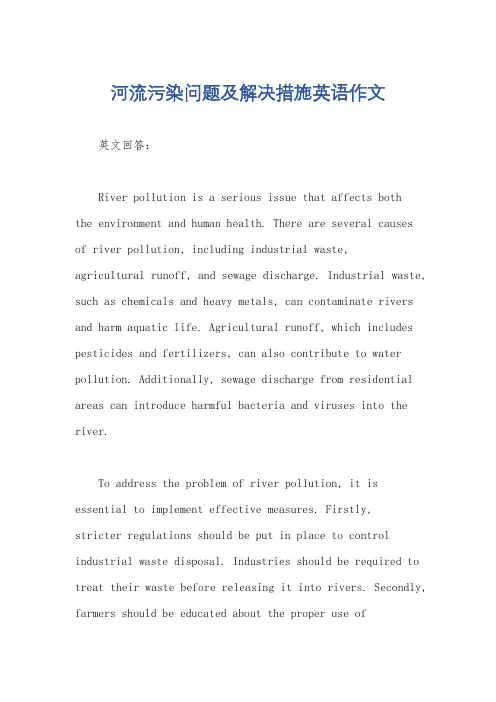
河流污染问题及解决措施英语作文英文回答:River pollution is a serious issue that affects boththe environment and human health. There are several causesof river pollution, including industrial waste,agricultural runoff, and sewage discharge. Industrial waste, such as chemicals and heavy metals, can contaminate rivers and harm aquatic life. Agricultural runoff, which includes pesticides and fertilizers, can also contribute to water pollution. Additionally, sewage discharge from residential areas can introduce harmful bacteria and viruses into the river.To address the problem of river pollution, it is essential to implement effective measures. Firstly,stricter regulations should be put in place to control industrial waste disposal. Industries should be required to treat their waste before releasing it into rivers. Secondly, farmers should be educated about the proper use ofpesticides and fertilizers to minimize agricultural runoff. They should also be encouraged to adopt sustainable farming practices, such as organic farming. Lastly, improved sewage treatment systems should be established to ensure that wastewater is properly treated before being discharged into rivers.In addition to these measures, public awareness and participation are crucial in combating river pollution. The government should launch campaigns to educate the public about the importance of clean rivers and the negative effects of pollution. Individuals can also contribute by reducing their use of plastic and properly disposing of waste to prevent it from ending up in rivers.In conclusion, river pollution is a significant problem that requires immediate attention. By implementing stricter regulations, promoting sustainable practices, and raising public awareness, we can work towards cleaner and healthier rivers.中文回答:河流污染是一个严重的问题,对环境和人类健康都有影响。
Water pollution has become a significant environmental issue that affects not only the quality of human life but also the ecological balance of our planet.The pollution of river water is a critical aspect of this problem,as rivers are the veins of the Earth, providing essential resources for human activities and supporting diverse ecosystems.Causes of River Water Pollution:1.Industrial Waste:Industries often discharge untreated or inadequately treated waste into rivers,which contains harmful chemicals and heavy metals that can be toxic to aquatic life and humans.2.Agricultural Runoff:The use of pesticides and fertilizers in agriculture can lead to nutrientrich runoff that contaminates rivers,causing eutrophication and algal blooms.3.Urban Runoff:Rainwater can pick up pollutants such as oil,grease,and trash from urban areas and carry them into rivers,affecting water quality.4.Sewage Discharge:Inadequate sewage treatment facilities can result in the direct discharge of untreated or partially treated sewage into rivers,introducing pathogens and organic matter.5.Mining Activities:Mining can release acidic and metalrich effluents into rivers,which can be detrimental to aquatic life and water quality.Effects of River Water Pollution:1.Health Risks:Contaminated river water can pose serious health risks to humans, especially when used for drinking,cooking,or recreational activities.2.Loss of Biodiversity:Pollution can lead to the death of fish and other aquatic organisms,disrupting the food chain and reducing biodiversity.3.Economic Impact:The decline in water quality can affect industries that rely on clean water,such as tourism,fishing,and agriculture,leading to economic losses.4.Ecosystem Disruption:The pollution can alter the natural balance of river ecosystems, affecting the habitats and survival of various species.Solutions to River Water Pollution:1.Strict Regulation:Implementing and enforcing stricter regulations on industrial and agricultural activities can help reduce the discharge of pollutants.2.Improved Waste Management:Upgrading sewage treatment plants and promoting the use of ecofriendly waste disposal methods can minimize the pollution of river water.3.Public Awareness:Educating the public about the importance of water conservation and the consequences of pollution can encourage responsible behavior.4.Restoration Efforts:Undertaking river restoration projects,such as the removal of invasive species and the reestablishment of natural habitats,can help heal damaged ecosystems.5.Technological Innovations:Developing and implementing advanced water treatmenttechnologies can help purify polluted water and reduce the environmental impact of human activities.In conclusion,the pollution of river water is a complex issue that requires a multifaceted approach to address.By understanding the causes,recognizing the effects,and implementing effective solutions,we can work towards preserving our rivers and ensuring a sustainable future for all.。
关于水污染的英语作文带翻译Water pollution is a critical issue that affects the health of our planet and its inhabitants. It is caused by various factors, including industrial waste, agricultural runoff, and improper sewage treatment.Water pollution has several detrimental effects on the environment. Firstly, it can lead to the death of aquaticlife as the toxic substances in the water can poison fish and other marine organisms. Secondly, it can disrupt the food chain, as contaminated water can be consumed by animals that are part of the food chain, leading to a ripple effect of health problems. Thirdly, polluted water can contaminate the soil, affecting plant life and the crops that humans rely on for sustenance.Moreover, water pollution poses a significant threat to human health. Contaminated water can lead to waterborne diseases such as cholera and dysentery. It can also cause long-term health issues, including kidney problems and cancer, due to the presence of harmful chemicals.To combat water pollution, it is essential to implementstrict regulations on industrial and agricultural waste disposal. Additionally, promoting the use of eco-friendly practices and technologies can help reduce pollution. Public awareness campaigns can also play a vital role in educating people about the importance of water conservation and theconsequences of water pollution.In conclusion, water pollution is a serious environmental concern that requires immediate attention. By working together, we can protect our water resources and ensure a healthy environment for future generations.水污染是一个影响我们星球及其居民健康的关键问题。
water pollution英语作文带翻译水,影响着我们的生存。
你对水污染有怎样的看法呢?大家不妨写一篇关于water pollution的英语作文描述一下吧。
下面是店铺为大家精心挑选的带翻译的water pollution英语作文,希望对大家有所帮助。
water pollution英语作文篇一With the development of industry water pollution is becoming more serious now. The polluted water not only kills fish it is also harmful to our health.Many people get sick because they drink the polluted water. In some rivers the water is so dirty that they can even kill plants.We should fight against the pollution. We should stop using harmful things.I wish it is not a dream that in the near future we can have clean rivers again.翻译:随着工业的发展水污染变得越来越严重了。
水污染不仅造成鱼类的死亡也对我们的健康有害。
很多人生病是因为他们喝被污染的水。
在一些河流的水太脏了他们甚至可以杀死植物。
我们应该对抗污染。
我们应该停止使用有害的事情。
我希望这不是一个梦想在不久的将来我们可以再次清洁的河流。
water pollution英语作文篇二My classmates and I had an outing this spring. We had a good time.、 But meanwhile I noticed that water pollution in our city was becoming more and more serious.On our way we could see women washing clothes in the river. Litter was floating on the river.Waste water produced by a chemical factory was being discharged into the river. We did not see any fish in the river.The fiver was not so clear as before. Water quality was verybad. I am worried about it because water is important to all living things.Man can not live without water. I hope people pay more attention to this problem especially the government.Try to control the pollution of water as early as possible.At last I would like to say "To protect water is to protect life."翻译:今年春天,我和我的同学去春游,我们玩得都很高兴。
高一优秀英语作文:关于河水污染的
感想
Last Sunday my father and I went fishing along a river. We
found the water so dirty that we could hardly catch fish in
it.
A lot of factories along the river always poured their
waste water and rubbish straight into the river which made
the river water polluted. In this way most of the fish in the
river were killed.
If the river water all over the country is polluted like
this, no living things will exist in the water. As we all
know, environmental pollution does great harm to living
things and human beings. Now more and more people have come
to realize how serious this problem is. Our government is
doing her best to take measures to fight against pollution.
We expect that the water in every river will be made cleaner
and cleaner before long.